The Birth of the Euro
The Dream of Unification
Mick Wallace Member of Irish Parliament "Life is very difficult for most people. The austerity measures that have been
implemented, at the behest of the Europeans, is very Draconian."
Ireland is a country in shock. Until five years ago, it was seen as one of Europe's greatest economic successes. Then
its economy collapsed, crushing living standards and forcing the government to slash public spending.
Mick Wallace "these are very conservative people. They do not protest easily. We don't turn the car is over. In France
and Italy, in Greece, if they are unhappy, legal onto streets, they make their feelings felt. We haven't done that here.
This is a new thing"
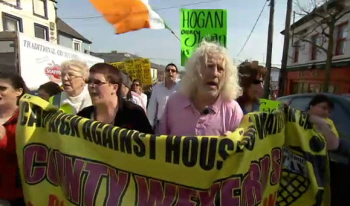
Mick Wallace is an independent member of the Irish Parliament. Today, he's leading the march against the latest austerity
measure – a tax of €100 on every Irish household.
Mick Wallace addressing the rally "It's hard to credit that five out of six people in Ireland have defied the government and refused
to pay. Politicians do not represent your interests. They represent big business and, right now, they're representing the financial
institutions. And I don't think these people should be encouraged."
In the small village of Gorey, the anger is palpable and raw, people at the end of their tether.
Protester "we can't live. We are in negative equity, we're struggling day by day, with cut backs on everything. I feel
betrayed by my country, betrayed by my politicians. I voted for people who told me lies and this is how they've driven a
knife into the soul of Ireland."
Across Greece, Italy, Portugal, Spain, as well as Ireland, Europe's citizens have taken to the streets. Rising
unemployment, vast cuts in public spending, it's the greatest squeeze on their living standards since the 1930s.
There is no great barrier protecting the United Kingdom from the tumultuous events across the Channel. The Eurozone is
our biggest export market, taking 40% of everything we sell abroad, and our banks are big creditors of Eurozone banks and
also big lenders in Spain and in Italy.
The recession in the Eurozone is one reason why the UK is back in recession. And if there were a financial Armageddon
in the eurozone, well, our banks would be back in intensive care and our economy would be facing meltdown too.
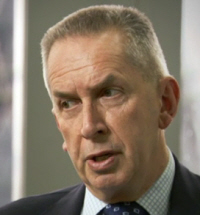
Terry Smith - CEO, Tullett Prebon
Terry Smith, CEO of Tullett Prebon "It's perfectly clear that we are better off not being inside the Eurozone."
Can we protect ourselves completely from events over there?
Terry Smith "Of course not, no. I mean, the British banks are very international, the British banking system is a very
large portion of our economy, much larger than other economies, and if the guarantees that the governments given for those
British banks were called, which they could be, in the event Eurozone goes down, we are without doubt the most indebted
country in the world."
So how and why did Europe get itself into this appalling predicament?
Its roots go all the way back to the end of the Second World War.
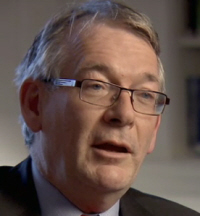
David Marsh, Author
David Marsh, Author "Three times, great conflicts had erupted from French and German soil, and the idea was after the
war, that this should never happen again. And money, as well as trade, and political rapprochement, were all keys to that
particular door. Winston Churchill was clearly very keen that France and Germany should come together and no longer cause
a problem for everybody else."

Winston Churchill
Winston Churchill "it is not a movement of parties, but a movement of people. Europe can only be united by the heartfelt
wish and the vehement expression of the great majority of all the people in all the parties, in all the freedom-loving
countries, no matter where they dwell, or how they vote."
Churchill was a promoter of a United States of Europe, though with Britain on the outside. The UK wasn't one of the
European pioneers which signed the Treaty of Rome in 1957. At the heart of the new European community stood the historic
enemies, West Germany and France, together with Italy, the Netherlands, Belgium and Luxembourg. As these countries
remove barriers to trade, the idea of a single European currency was always in the background, but made explicit in
the late 1960s.
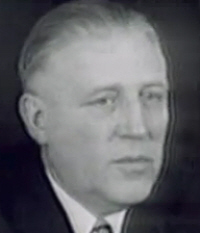
Pierre Werner
In 1970, on the instructions of governments, Pierre Werner, Luxembourg's premier, presented a plan to merge Europe's
currencies.
Pierre Werner "In particular, we have confirmed the irreversibility of the new currency."
But the target date of 1980 was unrealistic and the plan faded away, for a while. In the meantime, the European
Community continued to grow. In 1973, Britain joined, although some would say the UK has always been a semi-detached
and noisy member.
News Report "At least the newest members of the European Community made their presence known in the proper manner, in
one of the most British places in Brussels – the Queen Victoria pub opposite the common market headquarters. Raising
the flag was almost an afterthought and it was left to the community's concierge to do it, for the benefit of a few
reporters who bothered to come up."
Britain signed up for the wealth that would come from increased trade with Europe. Boulder constitutional
aspirations were still being nurtured in Germany and France. In 1981, François Mitterrand was elected President of France.
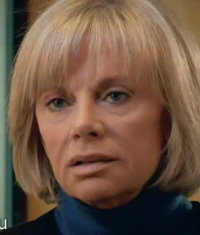
Elisabeth Guigou
Elisabeth Guigou, French Minister for Europe "During the war he had been a prisoner in Germany and he escaped three times.
Each time, he met Germans who helped him. Afterwards, he became obsessed with the idea that there should never be another war
and that Europe should unite."
A year later, Helmut Kohl became Chancellor West Germany.
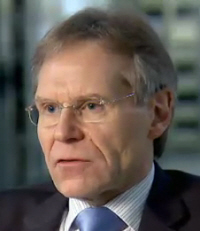
Prof. Hanns Jurgen Kusters
Professor Hans Jürgen Küsters "Kohl grew up only a few kilometres from the French border. As a youth, he lived through the
Second World War. He lost a brother during that time. He believed that there should never again be a war amongst peoples of Europe."
Norman Lamont "Kohl, because of the history of Germany, wanted to anchor Germany into Europe to make war impossible, and Mitterrand
had the same objective. And that is what the euro, and the European Union to some extent, are all about."
In 1984, they met at Vardun where, for the first time, these two nations paid tribute collectively to the soldiers whose lives
had been taken in two world wars.
Prof Hans Jürgen Küsters "Kohl always put emphasis on symbolism in his politics. For him, meeting with Mitterrand at Verdun was a
way of marking an end of Franco-German enmity. The Verdun meeting symbolised the determination of these towering European figures
to forge a more united Europe."
David Marsh "the common vision was to have a single currency, from the Atlantic, maybe to the Urals, that in some magical way
would do everything."







